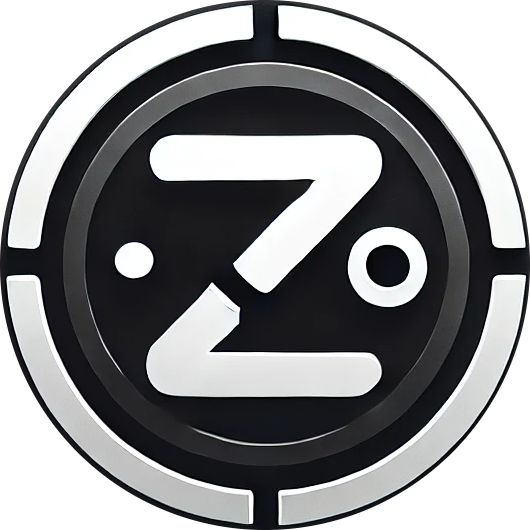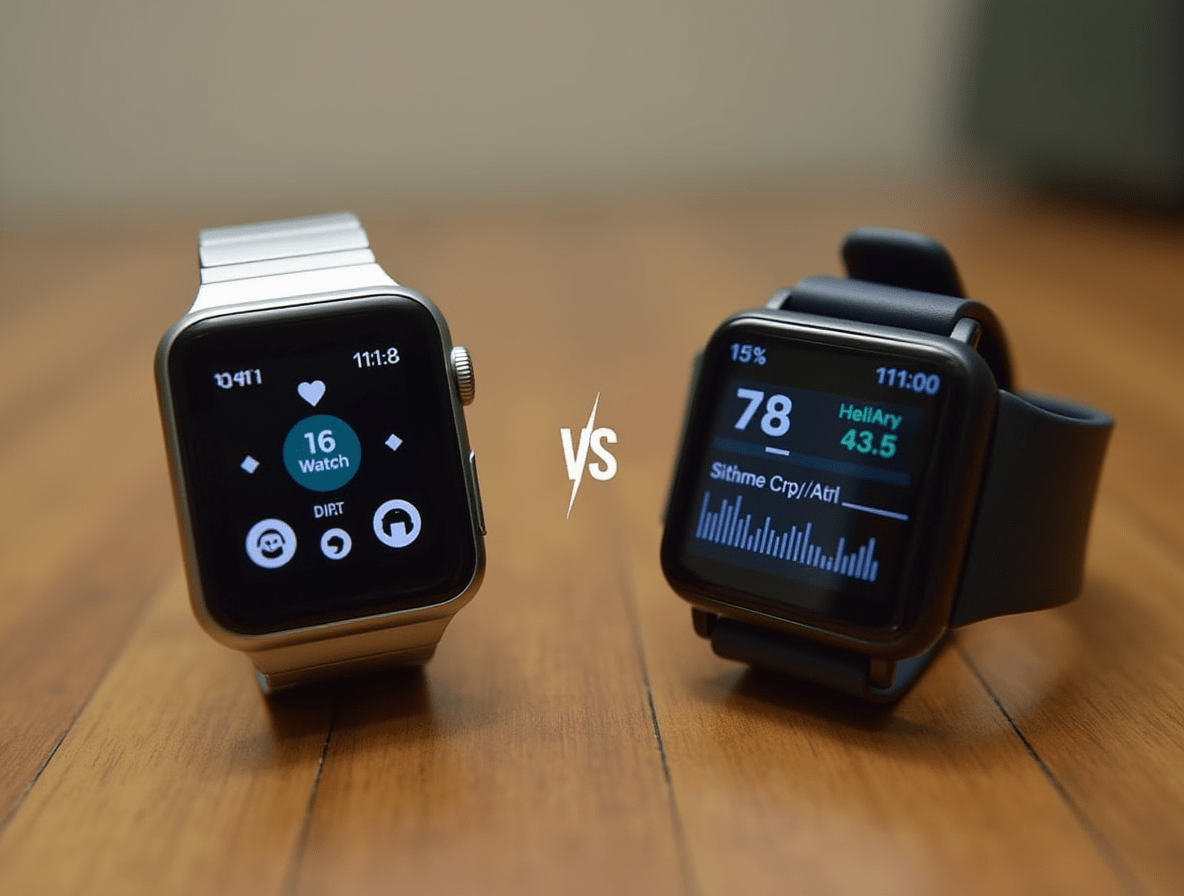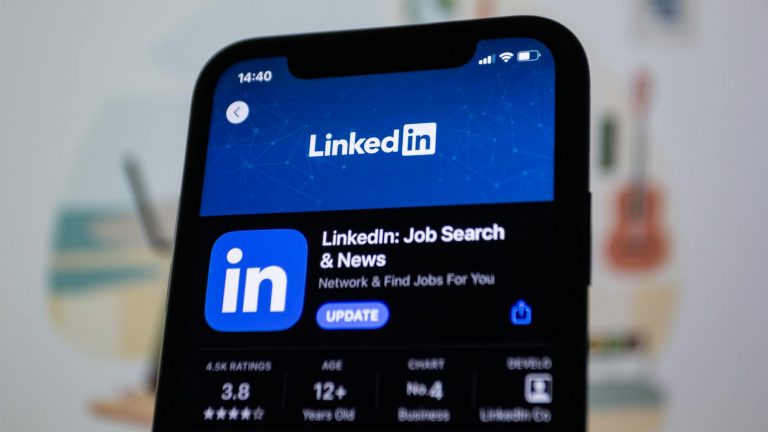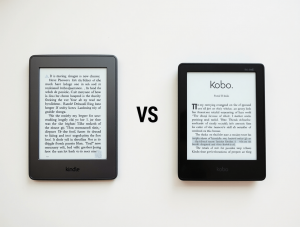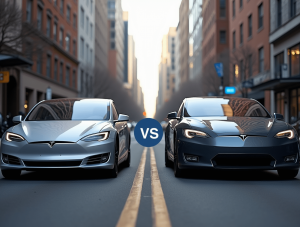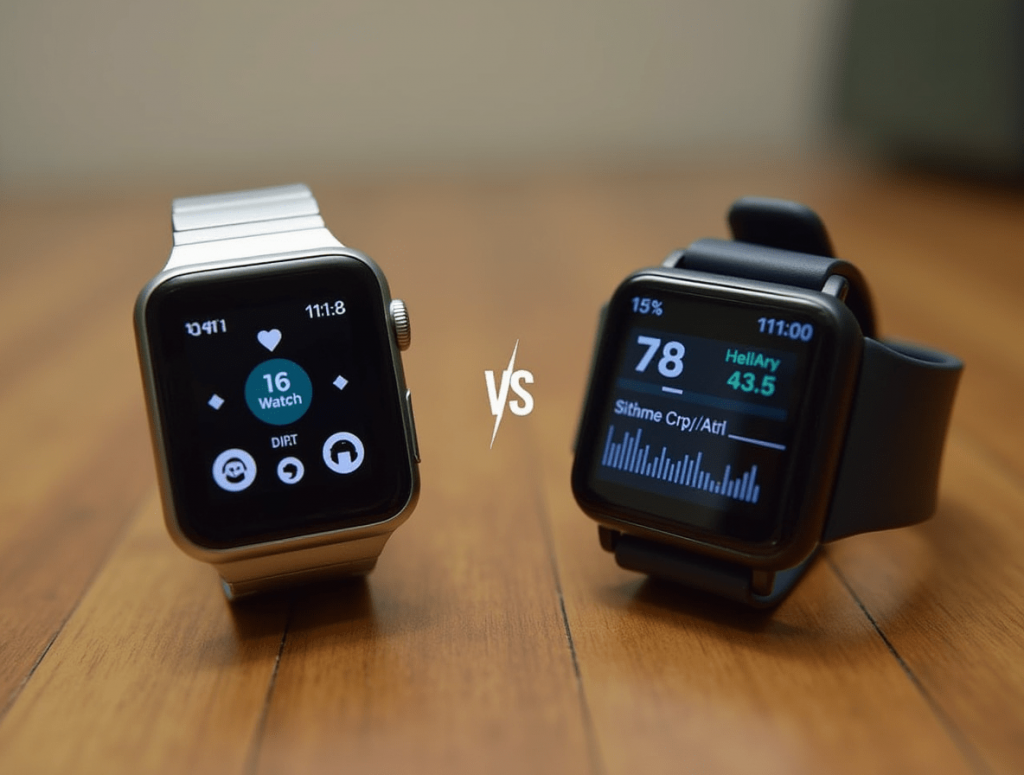
The Definitive Fitness Tracking Comparison (2025)
Did you know that wearing a fitness tracker can increase your daily step count by an average of 1,800 steps? With the wearable technology market expected to reach $96 billion by 2027, choosing between industry leaders Fitbit and Apple Watch has never been more challenging.
Both devices promise to transform your fitness journey with advanced health metrics, but they approach tracking in fundamentally different ways. This guide breaks down exactly how these wearables compare when it comes to tracking your workouts, monitoring your health, and helping you reach your fitness goals.
Current Device Lineups: Understanding Your Options
Fitbit’s Current Lineup
Fitbit’s product range focuses specifically on health and fitness tracking with various price points:
- Fitbit Inspire 3 – Budget-friendly basic tracker with essential metrics
- Fitbit Charge 6 – Advanced tracker with GPS and more health sensors
- Fitbit Versa 5 – Mid-range smartwatch with fitness focus
- Fitbit Sense 2 – Premium health watch with advanced sensors
- Google Pixel Watch 3 – Google-Fitbit collaboration with full smartwatch features
Apple Watch Lineup
Apple offers fewer models but with clear differentiation:
- Apple Watch SE (3rd gen) – Entry-level option with core fitness features
- Apple Watch Series 10 – Standard model with comprehensive health tracking
- Apple Watch Ultra 3 – Premium option with advanced fitness capabilities
Fitness Tracking Capabilities: Core Metrics Compared
Activity Tracking Basics
Both platforms excel at fundamental fitness tracking, but with different approaches:
- Step Counting: Both count steps with similar accuracy (±3-5% in controlled tests)
- Distance Tracking: Apple Watch has slight edge using GPS; Fitbit excels with step-based estimates
- Calorie Calculation: Apple uses more personalized metrics; Fitbit relies more on movement patterns
- Active Minutes: Fitbit’s Active Zone Minutes vs. Apple’s Activity Rings (different visual approaches to similar metrics)
Workout Detection and Tracking
How each platform handles specific exercises:
- Automatic Workout Detection: Both detect common activities like walking, running, cycling, and swimming
- Sport Modes: Fitbit offers 20+ activity types; Apple Watch supports 40+ workout types
- Manual Tracking: Apple Watch provides more detailed metrics during specific workouts
- Training Load Analysis: Apple Watch offers more advanced workout metrics for serious athletes
Health Monitoring: Beyond Simple Fitness
Heart Health Monitoring
Cardiac monitoring capabilities have become increasingly sophisticated:
- Heart Rate Accuracy: Apple Watch shows slightly better accuracy (±2% vs ±4% compared to medical devices) during high-intensity exercise
- ECG Functionality: Both offer FDA-cleared ECG apps, but Apple’s implementation provides more detailed analysis
- Heart Rate Variability: Apple provides more actionable insights from HRV data
- Irregular Rhythm Notifications: Both detect potential atrial fibrillation and other anomalies
Sleep Tracking Capabilities
Sleep analysis shows significant platform differences:
- Sleep Stages: Fitbit provides more detailed sleep stage analysis with better historical trends
- Sleep Score: Fitbit’s comprehensive sleep scoring system offers more actionable insights
- Battery Concerns: Fitbit’s longer battery life enables multiple nights of tracking without charging
- Integration: Apple’s sleep data connects better with other iOS health metrics
Specialized Health Metrics
Advanced sensors enable additional health monitoring:
- Blood Oxygen Monitoring: Both offer SpO2 tracking; Apple provides on-demand readings while Fitbit focuses on sleep-related oxygen variations
- Temperature Tracking: Fitbit Sense 2 offers more comprehensive temperature trend analysis
- Stress Management: Fitbit’s EDA sensor and stress management score provide more comprehensive stress analysis than Apple’s Mindfulness app
- Menstrual Health: Both offer period tracking; Fitbit provides more detailed symptom tracking and predictions
User Experience: Software and Ecosystem
Mobile Apps and Data Analysis
The companion apps significantly impact the overall experience:
- Fitbit App: More focused on long-term trends with better historical data presentation
- Apple Health: More comprehensive in collecting data from multiple sources but can feel overwhelming
- Goal Setting: Fitbit offers more customizable fitness goals; Apple focuses on closing activity rings
- Social Features: Fitbit’s community challenges create more engagement; Apple’s sharing is more limited
Battery Life and Charging
Perhaps the most significant practical difference:
- Fitbit Devices: 5-7 days for Versa/Sense models; up to 10 days for Inspire/Charge trackers
- Apple Watch: 18-36 hours for standard models; up to 72 hours for Ultra in low-power mode
- Charging Speed: Apple Watch charges faster (0-80% in about 45 minutes)
- Impact on Usage: Fitbit’s longer battery life enables continuous health monitoring without daily charging
Integration and Ecosystem Considerations
Smartphone Compatibility
Device compatibility is a major deciding factor:
- Fitbit: Works with both iOS and Android devices with full functionality
- Apple Watch: Requires iPhone; no Android compatibility
- Cross-Platform Experience: Fitbit offers more consistent experience across different smartphones
Third-Party App Support
The app ecosystem creates different possibilities:
- Fitbit: Limited app selection focused primarily on fitness and health
- Apple Watch: Extensive app store with thousands of options beyond fitness
- Fitness Apps: Both support major fitness services like Strava, but Apple offers better integration
- Music Services: Apple Watch supports more streaming services for workout music
Accuracy and Reliability: The Truth About Tracking
Scientific Validation
How these devices stack up in research settings:
- Heart Rate Accuracy: Cornell University research shows Apple Watch slightly more accurate during high-intensity workouts (±2.5% vs ±3.9% error rate)
- Sleep Analysis: Stanford Sleep Study found Fitbit more closely aligned with polysomnography for sleep stage detection
- Step Counting: Both show similar accuracy (±4-5%) in controlled walking tests
- Calorie Estimation: Both overestimate calorie burn by 15-20% compared to metabolic testing
Consistency and Reliability
Day-to-day performance considerations:
- GPS Accuracy: Apple Watch typically shows better GPS precision in challenging environments
- Sensor Consistency: Fitbit shows more consistent readings across days; Apple Watch sometimes varies with software updates
- Data Gaps: Apple Watch’s shorter battery life can create tracking gaps during charging periods
- Long-term Trends: Fitbit’s focus on consistent metrics makes trend analysis more reliable
Price and Value Comparison
Device Costs
Current pricing as of April 2025:
| Category | Fitbit | Price | Apple Watch | Price |
|---|---|---|---|---|
| Entry-level | Inspire 3 | $99.95 | SE (3rd gen) | $249 |
| Mid-range | Versa 5 | $229.95 | Series 10 | $399 |
| Premium | Sense 2 | $299.95 | Ultra 3 | $799 |
Subscription Considerations
Additional costs affect long-term value:
- Fitbit Premium: $9.99/month for advanced insights, detailed sleep analysis, and guided programs
- Apple Fitness+: $9.99/month for guided workouts and integration with Apple Watch metrics
- Free Features: Fitbit restricts more features behind subscription; Apple provides more functionality without additional fees
Making Your Decision: Who Should Choose Which Device?
Ideal Fitbit Users
Fitbit makes more sense if you:
- Want cross-platform compatibility (Android and iOS)
- Prioritize battery life and continuous health tracking
- Focus specifically on health metrics rather than smartwatch features
- Value detailed sleep tracking and stress management
- Prefer a simpler interface focused exclusively on health
Ideal Apple Watch Users
Apple Watch might be better if you:
- Already use an iPhone and other Apple devices
- Want a true smartwatch with fitness capabilities
- Need more advanced workout metrics for specific training
- Value third-party app integration and ecosystem
- Don’t mind daily charging for broader functionality
The Bottom Line: Which Wearable Tracks Fitness Better?
The “better” fitness tracker depends entirely on your specific needs and priorities:
Fitbit devices excel at continuous health monitoring with their superior battery life, more comprehensive sleep analysis, and stress tracking. Their focused approach to health metrics makes them ideal for those primarily interested in health insights rather than smartwatch features.
Apple Watch provides more accurate workout-specific metrics, better GPS tracking, and superior integration with both Apple’s ecosystem and third-party fitness services. Its comprehensive approach makes it better for serious athletes focusing on performance metrics.
For pure fitness tracking value, Fitbit’s lower-cost devices provide excellent health monitoring capabilities at a fraction of Apple Watch’s price. However, Apple Watch’s broader functionality may justify its higher cost for those who want both fitness tracking and smartwatch features.
FAQ: Common Fitbit vs Apple Watch Questions
Can Fitbit and Apple Watch track the same workouts?
Yes, both platforms track common activities like running, cycling, swimming, and strength training. Apple Watch offers more specialized workout types (40+ vs. Fitbit’s 20+), while Fitbit provides simpler tracking across fewer categories.
Which has better heart rate monitoring accuracy?
Testing shows Apple Watch is slightly more accurate during high-intensity exercise (±2% vs. Fitbit’s ±4% compared to medical-grade monitors). Both devices are sufficiently accurate for fitness purposes, though neither matches medical devices for diagnostic use.
Do I need the subscription services to get full functionality?
Fitbit restricts more features behind its Premium subscription, including detailed sleep analysis and stress management scores. Apple Watch provides more comprehensive metrics without requiring Apple Fitness+, though the subscription adds guided workouts and meditation.
Which is better for sleep tracking?
Fitbit devices generally provide more comprehensive sleep tracking with more detailed sleep stage analysis and better historical trending. Their longer battery life also makes overnight tracking more practical than Apple Watch’s daily charging requirement.
Can these devices detect health problems?
Both can detect certain irregular heart rhythms and provide notifications about potential issues. However, neither is a medical device, and both companies are careful to position these features as early warning systems rather than diagnostic tools.
